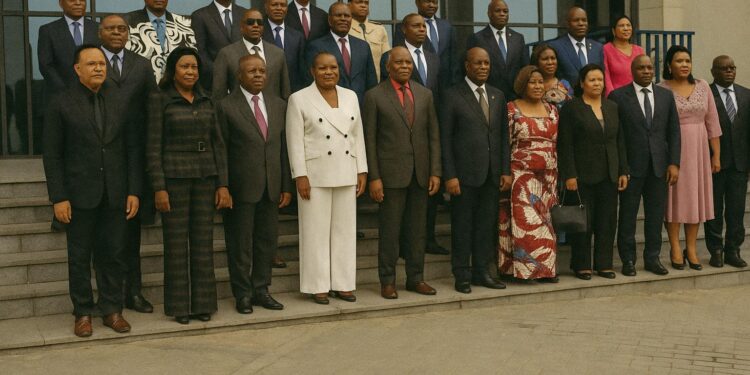Symbolism Anchored in Geography and History
The coincidence of two cities sharing a name across the Atlantic has long intrigued cartographers and historians. On 4 July, that coincidence crystalised into policy when Pointe-Noire in the Republic of Congo and Pointe-Noire in the French overseas region of Guadeloupe signed a twin-city accord. The agreement was formally introduced to the Congolese Senate three days later, where Speaker Pierre Ngolo greeted a visiting Guadeloupean delegation led by Mayor Camille Elisabeth. In remarks carried by national broadcaster Télé Congo and corroborated by regional daily France-Antilles, Mr Elisabeth framed the pact as both “symbolic and strategic”, designed to reconnect Afro-descendant communities with a landmass whose memory still courses through Caribbean cultural veins.
Brazzaville’s Calculated Embrace of Decentralised Diplomacy
Central government approval for municipal-level initiatives has become a quiet hallmark of President Denis Sassou Nguesso’s external posture. By encouraging local executives to cultivate South-South linkages, Brazzaville can advance diversification goals without straining sovereign balance sheets. Energy still underwrites more than half of Congo’s export revenue, yet the National Development Plan 2022-2026 lists cultural industries and tourism among emerging pillars. Senate President Ngolo’s endorsement of the twin-city accord therefore lands comfortably within the administration’s policy orthodoxy. Observers at the African Union’s Centre for Cultural and Artistic Research note that such municipal diplomacy can generate “low-risk, high-visibility wins” for a resource-dependent economy seeking reputational broadening.
Heritage Tourism: Memory as Economic Catalyst
Guadeloupe has cultivated memorial tourism since the opening of the Mémorial ACTe slavery museum in 2015. Visitor data from the French Caribbean Tourism Association report a 12 percent annual rise in diaspora travellers despite pandemic headwinds. Mayor Elisabeth sees Pointe-Noire, Congo, as a natural extension of that trajectory. Speaking to reporters outside the Senate chamber, he argued that “the Atlantic was once a corridor of pain; it can now become a corridor of shared prosperity.” Congolese counterpart Mayor Evelyne Tchichelle concurred, citing existing plans to rehabilitate the colonial-era railway terminus and transform Fort de Loango into a cultural precinct. If realised, the itinerary would allow Caribbean visitors to trace ancestral footsteps from slaving forts to contemporary craft markets, encouraging longer stays and higher per-capita spend.
Artisanal Renaissance and Skills Repatriation
The accord goes beyond tour packages. Both municipalities are drafting an exchange programme that pairs Guadeloupean designers steeped in Creole aesthetics with Congolese wood-carvers, weavers and copper-smiths. The Ministries of Small and Medium-Sized Enterprises in Brazzaville and Basse-Terre are expected to co-finance workshops under the banner “Racines Partagées” according to working documents reviewed by Les Dépêches de Brazzaville. Proponents argue that reviving pre-colonial craftsmanship addresses two policy objectives: cultural preservation and youth employment. World Bank figures place urban Congolese youth unemployment at roughly 19 percent; niche artisanal clusters could absorb some of that labour while elevating exportable brands.
Maritime Logistics: From Symbol to Supply Chain
Economists caution that heritage alone will not secure long-term dividends. The deep-water port of Pointe-Noire, Congo, already handles close to 700,000 TEUs annually, positioning it as Central Africa’s primary container gateway. Guadeloupe, though smaller in throughput, serves as a hub for inter-island cabotage across the Lesser Antilles. By aligning customs procedures and digitalising bills of lading, the twin municipalities aim to pilot a streamlined corridor for timber, cocoa derivatives and rum. A feasibility note circulated by the Port Management Association of the Caribbean suggests that even a modest 5 percent share of Congo’s outbound agro-forestry products could double Guadeloupean trans-shipment revenues within three years.
Diplomatic Optics and the South-South Narrative
The Pointe-Noire accord also feeds into a broader narrative of Afro-Caribbean solidarity that has gained traction in multilateral fora. At June’s Meeting of the Ministers of Culture of the Non-Aligned Movement in Baku, Congo and France’s overseas territories co-sponsored a resolution urging UNESCO to expand the Slave Route Project. While Guadeloupe remains under French sovereignty, its local authorities possess distinct legal personality in external cultural affairs, a nuance Paris has tacitly accepted. For Brazzaville, cultivating ties with French ultramarine regions offers diplomatic optionality: access to European expertise without the transaction costs that often accompany sovereign-level negotiations.
Navigating Expectations and Measuring Impact
Still, municipal accords risk languishing in symbolism if deliverables are not rigorously tracked. Civil-society groups in both cities have called for a joint observatory to publish annual scorecards on visitor arrivals, apprenticeship placements and trade volumes. In response, Mayors Elisabeth and Tchichelle signalled their intention to invite the Economic Commission for Africa to provide technical support. Such third-party monitoring would lend the initiative a robustness frequently absent in town-twinning exercises worldwide. As Professor Léonard Obambé of Marien Ngouabi University observes, “The historical resonance is undeniable, but sustainable value will flow only from disciplined execution.”
A Quiet but Resonant Step in Congo’s Diversification Odyssey
Measured against the headline numbers of liquefied natural gas or iron-ore concessions, a cultural-economic accord with a Caribbean municipality may appear modest. Yet its political economy significance lies precisely in that modesty. It leverages existing social capital, minimises fiscal exposure and aligns with Congo’s aspiration to project soft power without antagonising great-power patrons. In the closing minutes of the Senate audience, Speaker Ngolo voiced the sentiment succinctly: “Let the oceans that once divided now unite our peoples in practical harmony.” His words encapsulate a wager that memory, if stewarded prudently, can generate both dignity and dividends across the Atlantic expanse.












































